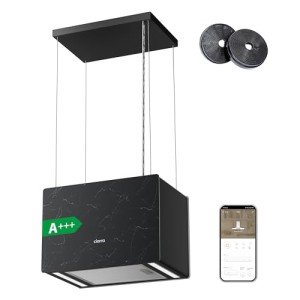20 Trailblazers Leading The Way In Island Hob
페이지 정보
본문
The Island Vent Hood: A Comprehensive Guide to Choosing and Installing the Perfect Kitchen Feature
In modern kitchen design, the island cooker hoods 60cm vent hood has actually become a vital focal point, perfectly combining performance with aesthetic appeal. With the rise of open-concept living spaces, where kitchens are integrated with dining and living areas, the value of a properly designed ventilation system has actually ended up being critical. This short article explores what an island vent hood is, the different types available, key features to think about, installation ideas, and FAQs surrounding this essential kitchen element.
What is an Island Vent Hood?
An island vent hood is a kitchen ventilation system designed to be set up above an island cooktop or range. Unlike conventional wall-mounted hoods, island hoods are suspended from the ceiling, supplying a clear view of the cooking area while efficiently getting rid of smoke, steam, and smells from the kitchen. This makes island island vent hood hoods an attractive alternative for open layouts while making sure a clean and comfy cooking environment.
Types of Island Vent Hoods
When choosing an island vent hood, it is vital to comprehend the numerous types offered in the market. Here are the main classifications:
| Type | Description |
|---|---|
| Ducted | Ventilation is directed outside, providing the best air quality by expelling air and smells. |
| Ductless | Uses filters to clean the air and recirculate it back into the kitchen; simpler to install. |
| Convertible | Can run in both ducted and ductless modes, offering versatility in installation. |
| Under-Cabinet | Mounted under kitchen cabinetry; typically lower output, appropriate for smaller sized kitchen designs. |
Secret Features to Consider
Choosing the ideal island vent hood involves several vital factors. Here are the necessary features to consider:
- Size: The hood needs to be at least as wide as the cooktop. Ideally, it needs to extend 6 inches on either side for optimal efficiency.
- CFM Rating: The Cubic Feet per Minute (CFM) score shows the hood's ventilation power. Greater CFM is necessary for heavy cooking, while lower CFM might be sufficient for lighter usage.
- Noise Level: Measured in sones, a lower sone score shows a quieter operation. A peaceful extractor fan kitchen island is particularly essential in open-concept spaces.
- Lighting: Many island hoods come geared up with integrated lighting. LED lights are popular for their energy effectiveness and longevity.
- Style: Island vent hoods been available in various designs, including modern-day, conventional, and commercial. Select a hood that complements the overall kitchen visual.
Installation Tips
Setting up an island vent hood can be a complex procedure. Here are some important pointers to assist in the installation:
- Check regional codes and guidelines to guarantee compliance with installation height and electrical requirements.
- Determine the hood's height: The top of the hood must be 30 to 36 inches above the cooking surface area, depending on the manufacturer's suggestions.
- Protect the mounting bracket: Ensure that the installing bracket is properly anchored to the ceiling to support the weight of the hood and motors.
- Ductwork considerations: If using a ducted system, ensure correct duct size and layout for optimum air flow. Avoid sharp bends in ducting, which can restrain air motion.
- Electrical setup: Ensure that the electrical connections fulfill your hood's power requirements, and think about working with a licensed electrical contractor for complicated setups.
Expense Considerations
The cost of an island vent hood can range considerably depending upon functions, materials, and brand name. Below is a breakdown of potential costs connected with getting and installing these hoods:
| Cost Element | Estimated range hoods for islands |
|---|---|
| Basic Models | ₤ 300 - ₤ 600 |
| Mid-range Models | ₤ 600 - ₤ 1,200 |
| High-End Models | ₤ 1,200 - ₤ 3,000+ |
| Installation Costs | ₤ 200 - ₤ 500 |
Frequently Asked Questions
1. How frequently should I clean my island vent hood?Regular cleansing is advised, with deep cleansing a minimum of when a month, specifically if you cook regularly. 2. Can I install an island vent

hood myself?While it is possible, expert
setup is advised for security and optimal performance, particularly with ductwork and electrical connections. 3. Are ductless island hoods effective?Ductless cooker hoods for islands can effectively filter
smoke and smells, but they might not be as effective as ducted designs. They require regular filter replacements and maintenance. 4. What sort of maintenance does an island vent hood require?Regular cleaning of filters, lights, and hoods, together with looking for any wear and tear on motors or ductwork is crucial for maintaining performance
. 5. What kind of filters should I use?Most island vent hoods use aluminum or charcoal filters. Aluminum filters are multiple-use, while charcoal filters need to be replaced
periodically. The island vent hood is a crucial part of a modern kitchen, supplying fatigue of undesirable smells and making a striking design statement. Selecting the ideal type, understanding important
features, and sticking to appropriate setup methods will guarantee optimum performance and longevity of this kitchen device. Whether you are an experienced chef or a periodic home cook, the right island vent hood can considerably enhance your cooking experience. By following the standards and factors to consider detailed in this article, house owners can make educated choices and take pleasure in a cleaner and more satisfying cooking environment.

